最新新概念英语第一册117课课件
合集下载
新概念英语第一册117课课件45358教学教材
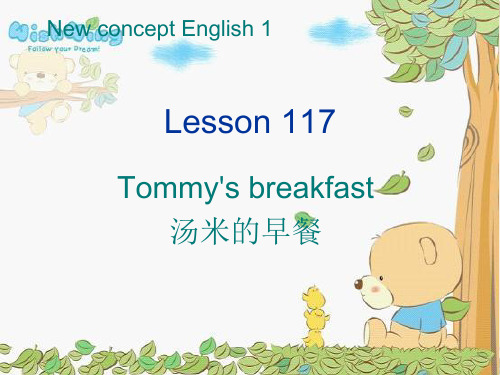
在分词
Theyห้องสมุดไป่ตู้were not watching TV. 3、疑问句:was/were + 主语+ 现在
分词
Was he writing a letter last night?
❖ 常用时间状语
When, while, a moment ago, from nine to ten last evening, at that time ❖ when既指时间点,也可指一段时间, while只指 一段时间,因此when引导的时间状语从句中 的动词可以是终止性动词,也可以是延续性动 词,而while从句中的动词必须是延续性动词。
o’clock last night.
Practice Time!
1. While she ___ TV, Penny ___ asleep.
A. watches, was falling B. was watching, fell C.was watching, was falling D. watch, fell KEY: B
7. Mike and I___(play) basketball at that time yesterday afternoon.
课文讲解
❖ When my husband was going into the dining room this morning, he dropped some coins on the floor.
❖ There were coins everywhere. We looked for them, but we could not find them all.
❖ everywhere 到处 ❖ look for 寻找(强调动作和过程) ❖ find 找到 (强调寻找的结果) ❖ 我找遍了任何地方都找不到我的钢笔。
Theyห้องสมุดไป่ตู้were not watching TV. 3、疑问句:was/were + 主语+ 现在
分词
Was he writing a letter last night?
❖ 常用时间状语
When, while, a moment ago, from nine to ten last evening, at that time ❖ when既指时间点,也可指一段时间, while只指 一段时间,因此when引导的时间状语从句中 的动词可以是终止性动词,也可以是延续性动 词,而while从句中的动词必须是延续性动词。
o’clock last night.
Practice Time!
1. While she ___ TV, Penny ___ asleep.
A. watches, was falling B. was watching, fell C.was watching, was falling D. watch, fell KEY: B
7. Mike and I___(play) basketball at that time yesterday afternoon.
课文讲解
❖ When my husband was going into the dining room this morning, he dropped some coins on the floor.
❖ There were coins everywhere. We looked for them, but we could not find them all.
❖ everywhere 到处 ❖ look for 寻找(强调动作和过程) ❖ find 找到 (强调寻找的结果) ❖ 我找遍了任何地方都找不到我的钢笔。
新概念英语第一册117-118课课件

• 当她正在打扫房间的时候,她的丈夫给她打了 电话。
• While she was cleaning the room, her husband telephoned her.
• 当孩子正在花园玩的时候,开始下雨了。 • As the children were playing in the garden, it
单词学习
• dinning room(hall) • coin • mouth • swallow • later • toilet
饭厅
n. 硬币 n. 嘴 v. 吞下 adv. 后来 n. 厕所,盥洗室
• swallow • ① v. 吞下,咽下
• Tommy swallowed the coins. • ② v. 抑制,使不流露
• 此句是过去进行时,结构是was/ were+ doing • 表示过去某个时刻正在进行或发生的动作。
过去进行时
• 构成 • was/ were + 现在分词 • 否定句式:在was/ were的后面加not • 疑问句式:把was/ were提前 • I was doing my homework this morning. • I was not doing my homework this morning. • What were you doing this morning?
A is doing B. has done C. was doing 6.Mrs White ___B__dinner when her son came home.
A. is cooking B. was cooking C. are cooking D. were cooking
• I tried hard to swallow my doubts. • 我强忍着不露出怀疑的神色。 • 她忍住没笑,静静地坐在那里。
• While she was cleaning the room, her husband telephoned her.
• 当孩子正在花园玩的时候,开始下雨了。 • As the children were playing in the garden, it
单词学习
• dinning room(hall) • coin • mouth • swallow • later • toilet
饭厅
n. 硬币 n. 嘴 v. 吞下 adv. 后来 n. 厕所,盥洗室
• swallow • ① v. 吞下,咽下
• Tommy swallowed the coins. • ② v. 抑制,使不流露
• 此句是过去进行时,结构是was/ were+ doing • 表示过去某个时刻正在进行或发生的动作。
过去进行时
• 构成 • was/ were + 现在分词 • 否定句式:在was/ were的后面加not • 疑问句式:把was/ were提前 • I was doing my homework this morning. • I was not doing my homework this morning. • What were you doing this morning?
A is doing B. has done C. was doing 6.Mrs White ___B__dinner when her son came home.
A. is cooking B. was cooking C. are cooking D. were cooking
• I tried hard to swallow my doubts. • 我强忍着不露出怀疑的神色。 • 她忍住没笑,静静地坐在那里。
新概念英语NCE1_lesson117-118-119课件

the room.
•
她正在擦鞋时,乔治敲门了。
•
Just as she was cleaning her shoes, George knocked at
the door.
•
我做饭时,他正在花园里劳作。
•
While I was cooking the dinner ,he was working in the
• When I left, it began to rain. • When I saw him, he was drinking some tea. • 当我到达伦敦的时候,天黑了下了。 • 昨天晚上十点我正在看电视. • 当Mary正在做早饭的时候,我正在看报纸
过去进行时
• 概念:
•
1、在过去某个特定的时间正在进行或发生的动作。
•
2、当过去的一个动作发生的时候另外一个动作正在
进行。
• 结构:
•
S+ was(were)+ doing
•
S+ wasn’t(weren’t) +Ving
•
Was(Were) +S +Ving?
•
I was reading a book at 7 o’clock yesterday.
•
I wasn’t reading a book at 7 o’clock yesterday.
★swallow v. 吞下
•
① v. 吞下,咽下
•
Tommy had swallowed the coins.
•
② v. 抑制,使不流露
•
She swallowed a smile and sat there still.
新概念英语第一册117课 课件(共17张PPT)
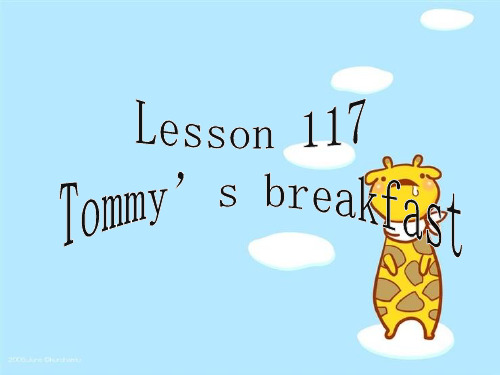
• 4. The boss arrived when she was typing a letter.
• 5. The train left when I was buying the tickets.
• 6. It rained heavily when I was driving to London.
A. is having B. have C. has D. was having
4. What ____ you ____from 7 to 9 yesterday ? A. were, doing B. did. do C. have, done
5.Look! Lily with her sister __ a kite on the playground.
shaving
cut
Exercise P239
• 1. He knocked at the door when I was answering the phone.
• 2. He came downstairs when I was having breakfast.
• 3. The phone rang when I was washing the dishes.
过去进行时VS现在进行时
结构
现在am/is/are+v-ing 过去was/were+v-ing
The students are drawing pictures now.
The students were drawing pictures when the teacher came in.
3.时间状语:
New words and expressions
dining room
• 5. The train left when I was buying the tickets.
• 6. It rained heavily when I was driving to London.
A. is having B. have C. has D. was having
4. What ____ you ____from 7 to 9 yesterday ? A. were, doing B. did. do C. have, done
5.Look! Lily with her sister __ a kite on the playground.
shaving
cut
Exercise P239
• 1. He knocked at the door when I was answering the phone.
• 2. He came downstairs when I was having breakfast.
• 3. The phone rang when I was washing the dishes.
过去进行时VS现在进行时
结构
现在am/is/are+v-ing 过去was/were+v-ing
The students are drawing pictures now.
The students were drawing pictures when the teacher came in.
3.时间状语:
New words and expressions
dining room
新概念英语第一册第117-118课课件
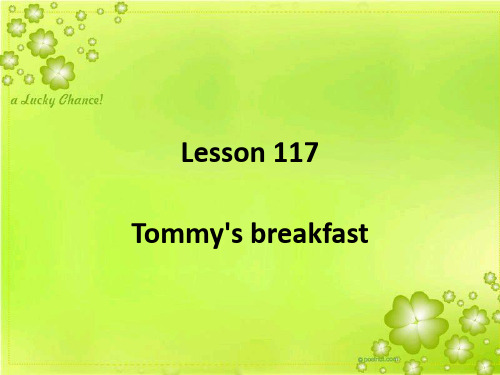
mouth n. 嘴
• • • • • • • • Open your mouth. 嘴里塞满食物时不要说话。 Don’t talk with your mouth full! It sounds funny in your mouth. 这种话由你的口中说出来,听起来就很可笑 a useless mouth光吃不做的人, 饭桶 a big mouth[美俚]碎嘴子; 说话冒失的人; 爱吹牛, 说大话的人 Tom was born with a silver [golden] spoon in his mouth.汤姆生 于富贵之家。 • from hand to mouth 勉强糊口 • from mouth to mouth口口相传的
• He put them both into his mouth. We both tried to get the coins. But it was too late. Tommy had already swallowed them! • put sth +介词短语 把…东西放在… • 把书放在桌子上 • Put the books on the desk. • both表示“两个都…” • 他们俩都想去法国。 • They both want to go to France. • 三者或三者以上用all • 他们大家都幸福 • They were all happy.
• • • • • •
• • • • •
2.表示过去某一阶段一直在进行的动作。 他们昨天在等你。 They were waiting for yesterday. 她去年在写一部小说。 She was writing a story last year. 3.表示从过去某一个时间的角度看将要发生的 动作,用于某些瞬间动作;go, come, leave, stay, fly 等。 几天后他们要离开。 They are leaving in a few days. They were leaving a few days later. 他告诉我他的哥哥要到苏州去。 He told me that his brother was going to Suzhou.
新概念英语第一册117-118课PPT

• 3.leave, arrive, start, die 等用在过去进行时表 示“快要完成,即将…”。而用在一般过去时 当中则表示“己经完成”。 • 火车快要停了。 • The train was stopping. • 火车停了。 • The train stopped.
• ⑴ I saw Lisa in the street yesterday,but she didn’t see me . • She the other way. (2008年,徐州) • A. was looking B.is looking C.looked D.has looked • ⑵—What did the teacher say just now? (2008年,河南) • --Sorry, I didn’t catch it.I something else. • A.think B.will think • C.was thinking D.had thought • ⑶I___my homework while my parents____TV last night. (2006年,南 京) • A.did;have watched B.was doing;were watching • C.had done;were watching D.would do;were watching • ⑷—Did you see the traffic accident yesterday? (2005年,苏州) • --Yes.It happened when I_______past the museum. • A.walk B.am walking C.will walk D.was walking
coin /kɔin/ n. 硬币 a silver coin 银币 你能把这个一美元的纸币换成硬币吗? Could you change the one-pound note into coin? mouth /mauθ/ n. 嘴 Open your mouth.
新概念1 Lesson117-118课件
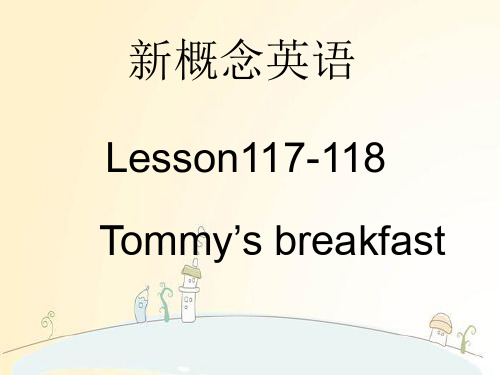
Tommy’s been to= has been to 现在完成时 去过
课文解析
• When my husband was going into the dining room this morning, he dropped some coins on the floor.
• While we were having breakfast, our little boy, Tommy, found two small coins on the floor.
• 4. The bread was very hard and I couldn't
(吞下)it.
• 5.Open your
(嘴)and say“Ah...”.
• 6.There are some
(硬币)on the table.
• 7.The old man s
on the street and broke his leg.
课文解析
• While we were having breakfast, • our little boy, Tommy, found two
small coins on the floor.
while 当.....时 Tommy 是the little boy 的同位语
课文解析
He put them both into his mouth. We both tried to get the coins, but it was too late. Tommy had already swallowed them!
small coins on the floor.
He put them both into his mouth. We both tried to get the coins, but it was too late. Tommy had
课文解析
• When my husband was going into the dining room this morning, he dropped some coins on the floor.
• While we were having breakfast, our little boy, Tommy, found two small coins on the floor.
• 4. The bread was very hard and I couldn't
(吞下)it.
• 5.Open your
(嘴)and say“Ah...”.
• 6.There are some
(硬币)on the table.
• 7.The old man s
on the street and broke his leg.
课文解析
• While we were having breakfast, • our little boy, Tommy, found two
small coins on the floor.
while 当.....时 Tommy 是the little boy 的同位语
课文解析
He put them both into his mouth. We both tried to get the coins, but it was too late. Tommy had already swallowed them!
small coins on the floor.
He put them both into his mouth. We both tried to get the coins, but it was too late. Tommy had
新概念英语第一册第117-118课件

n. 嘴
Open your mouth.
张开(zhānɡ kāi)你的嘴。
Shut your mouth.
闭嘴〔口〕
face, eyebrows, eye, nose, ear, mouth
from hand to mouth 勉强糊口
from mouth to mouth 口口相传的
have a big mouth
arrived. v 当他刮胡子的时候,他伤到他自己了。 v He cut himself while he was shaving. v 当我妻子在做饭的时候,我在花园里工作。 v My wife was cooking the dinner while I was
working in the garden.
第十一页,共36页。
Key words and expressions
• 三天后 • 回头见,再见 • 早晚,总有一天 • 他比平常(píngcháng)
来得晚
• three days later • see you later • sooner or later • He came later than
Pay a person back in his own coin. 以其人之道还治其人之身。 你能把这个一美元的纸币换成硬币吗?
Could you change the one-dollar note into coins?
第九页,共36页。
Key words and expressions
★ mouth
v
v 这个箱子太重,我搬不动。 v The box is too heavy for me to carry.
第十五页,共36页。
新概念英语第一册第117课完整ppt课件

精选ppt
阅读课文回答问题
What does the she mean by ‘change’ in the last sentence ?
精选ppt
再看一遍课文
精选ppt
When my husband was going into the dining room this morning
精选ppt
续的或同时发生的,那么主从句的动词都可用过去
进行时。
精选ppt
本课语法过去进行时
1.过去进行时由“主语+was/were+动词ing”构成 2.过去进行时的否定式由“主语+was/werenot+现 在分词”构成 3.过去进行时的疑问式由“was/were+主语+现在 分词”组成 句型 肯定句=主语+was/were+doing+其它 否定句=主语+was/were+not+doing+其它 一般疑问句问语=Was/Were+主语+doing+其它 答语:Yes,Iwas/were.或No,Iwasn't/were’t. 特殊疑问句=特殊疑问词精+选p一pt 般疑问句+其它
精选ppt
本课语法
1.look for,寻找(强调动作过程);find,找到(强调寻找的结 果)。 2.Tommy had already swallowed them! 汤米已经把硬币咽了下去 句中用了过去完成时形式 had swallowed。过去完成时用来表示过去 两个动作中发生在前的那个动作。显然,句中咽下硬币的动作发生在 夫妇俩能够把硬币从汤米手中抢过来之前。 3.later that morning,那天上午的晚些时候。 later是副词late的比较级。 4.any change change是个多义词,既有“零钱”的意思,也有“变化”的意思。此 处既可指“硬币”;也可指“情况的变化”。这是双关(pun /p)n/) 修辞法。
阅读课文回答问题
What does the she mean by ‘change’ in the last sentence ?
精选ppt
再看一遍课文
精选ppt
When my husband was going into the dining room this morning
精选ppt
续的或同时发生的,那么主从句的动词都可用过去
进行时。
精选ppt
本课语法过去进行时
1.过去进行时由“主语+was/were+动词ing”构成 2.过去进行时的否定式由“主语+was/werenot+现 在分词”构成 3.过去进行时的疑问式由“was/were+主语+现在 分词”组成 句型 肯定句=主语+was/were+doing+其它 否定句=主语+was/were+not+doing+其它 一般疑问句问语=Was/Were+主语+doing+其它 答语:Yes,Iwas/were.或No,Iwasn't/were’t. 特殊疑问句=特殊疑问词精+选p一pt 般疑问句+其它
精选ppt
本课语法
1.look for,寻找(强调动作过程);find,找到(强调寻找的结 果)。 2.Tommy had already swallowed them! 汤米已经把硬币咽了下去 句中用了过去完成时形式 had swallowed。过去完成时用来表示过去 两个动作中发生在前的那个动作。显然,句中咽下硬币的动作发生在 夫妇俩能够把硬币从汤米手中抢过来之前。 3.later that morning,那天上午的晚些时候。 later是副词late的比较级。 4.any change change是个多义词,既有“零钱”的意思,也有“变化”的意思。此 处既可指“硬币”;也可指“情况的变化”。这是双关(pun /p)n/) 修辞法。
新概念117课 课件
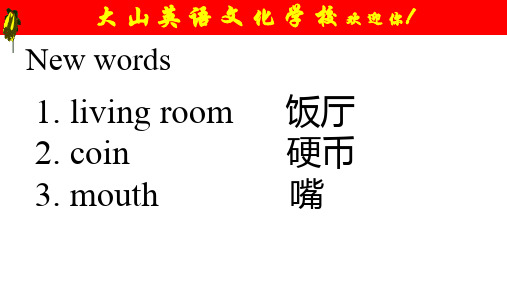
4.look for sb/sth. 寻找某人或某物(动作过程)
find ... 找到……
(强调结果)
大 山 英 语 文 化 Байду номын сангаас 校 欢 迎 你!
练习
1.My husband was going into the living room.
W__h__a_t _w__a_s_ _y_o_u_r_ husband _d_o_i_n_g_?
大 山 英 语 文 化 学 校 欢 迎 你!
New words
1. living room 2. coin 3. mouth
饭厅 硬币 嘴
大 山 英 语 文 化 学 校 欢 迎 你!
L117 Tommy's brekfast 汤米的早餐
1. When my husband was going into the dining room this morning, he dropped some coins on the floor.
W__e_re_ _y_o_u_ _sl_e_e_p_i_n_g_ at this time yesterday?
大 山 英 语 文 化 学 校 欢 迎 你! 2.drop sth. +介词短语 把某物掉到某处
3. everywhere =_h_e_r_e_ and _t_h_e_r_e__ 处处,到处
2. He dropped some coins on the floor.
W__h_e_r_e_d_i_d_ he _d_r_o_p__ _a_n__y_ coins?
大 山 英 语 文 化 学 校 欢 迎 你!
练习
3.There were coins everywhere.
相关主题
- 1、下载文档前请自行甄别文档内容的完整性,平台不提供额外的编辑、内容补充、找答案等附加服务。
- 2、"仅部分预览"的文档,不可在线预览部分如存在完整性等问题,可反馈申请退款(可完整预览的文档不适用该条件!)。
- 3、如文档侵犯您的权益,请联系客服反馈,我们会尽快为您处理(人工客服工作时间:9:00-18:30)。
主句,一般过去时
Tommy, 是our little boy的同位语,补充说明。
当孩子正在花园玩的时候,开 始下雨了。
While the children were playing in the garden, it began to rain.
He put them both into his mouth, we both tried to get the coins, but it was too late. Tommy had already swallowed them!
later 1) adv. 后来,较迟地,较后地
e.g. three days later 三天后
See you later. 回头见,再见。 sooner or later 早晚,总有一天 2)adj. 较迟的,较后的,更近的。
e.g. Let’s take a later train. 我们搭晚一点的火车吧。
厨房
coin
n. 硬币(可数名词)
e.g. Every coin has two sides.
每个事物都有两面性。
coin n. 硬币 (note 纸币)
toss a coin 掷硬币(打赌正面或反面)
Pay a person back in his own coin.
以其人之道还治其人之身。
mouth n. 嘴
引导词“当 ......时”
从句
过去进行时:was/were + doing 强调过去某个时间正在发生的事。
go into 走进,强调“进入”的动作,反义词 go out of 走出…
主句为一般过去时,表示过去某一动作进行的同时发生了另外的情况
drop 掉下 小心,别把花瓶摔了。
Be careful! Don’t drop the vase.
新概念英语第一册117课课 件
New words
dinning room ['dainiŋ'ru:m] 饭厅
coin [kɔɪn]
n.硬币
mouth [maʊθ]
n.嘴
swallow ['swɔləu] v.吞下
later ['leɪtə] adv.后来
toilet ['tɒɪlɪt] n. 厕所,盥洗室
He put them both into his mouth. put sth +介词短语 把…东西放在…
Key words&expressions
★ toilet n. 厕所,盥洗室
bathroom/washroom /restroom
public conveniences 委婉用语(英)
comfort stat) 委婉用语(欧)
Time for listening!
There were coins everywhere. We looked for them, but we could not find them all.
Language points
2. there were coins everywhere. 复合不定代词
We looked for them, but could not find them all.
Key words&expressions
dining room coin
mouth swallow later toilet ring
饭厅 硬币
嘴 吞下 后来
厕所 响
dining room 饭厅
living room
起居室,客厅
bedroom 卧室
bathroom
洗浴室,卫生间
kitchen
e.g. Don’t talk with your mouth full!
嘴里塞满食物时不要说话。
swallow v. 1)吞下,咽下 Tommy swallowed the coins.
2) n. 一口(一口的量) take a swallow of beer 喝一口啤酒 at one swallow 一饮而尽
all 用来强调每一个硬币。从语法上讲,all 是 them 的同位语,(紧跟在一个名词或代词后,进一步说明 前面名词或代词是谁或什么东西)也可以说成 all of
them 。them all= all of them
While we were having breakfast, Our little boy, Tommy, found two small coins on the floor.
look for 寻找,强调动作。look是不及物动词。 find 找到,强调结果。find是及物动词。
例:I looked for the dog everywhere, and found it in the garden at last.
co我ul到d是处c找an那的只过狗去,式最后在花园里找到了它。
Look, listen and answer
Q1. What did the man drop on the floor? Q2. What did Tommy find on the floor? Q3. How many times has Tommy been to the
toilet?
When my husband was going into the dining room this morning, he dropped some
4.While we were havi从ng句breakfast, our little boy,
Tommy, found two small coins on the floor. 在某事发生的同时,发生了某事。While引导的时间状语
were /was+动词从ing句过。去进行时 while时间状语从句引导词“当......时”
coins on the floor.
Language points
1.When my husband was going into the dining
room this morning, he dropped some coins on
the floor.
时间状语从句
此句为复合句,when引导时间状语从句, 说明故事发生的时间
Tommy, 是our little boy的同位语,补充说明。
当孩子正在花园玩的时候,开 始下雨了。
While the children were playing in the garden, it began to rain.
He put them both into his mouth, we both tried to get the coins, but it was too late. Tommy had already swallowed them!
later 1) adv. 后来,较迟地,较后地
e.g. three days later 三天后
See you later. 回头见,再见。 sooner or later 早晚,总有一天 2)adj. 较迟的,较后的,更近的。
e.g. Let’s take a later train. 我们搭晚一点的火车吧。
厨房
coin
n. 硬币(可数名词)
e.g. Every coin has two sides.
每个事物都有两面性。
coin n. 硬币 (note 纸币)
toss a coin 掷硬币(打赌正面或反面)
Pay a person back in his own coin.
以其人之道还治其人之身。
mouth n. 嘴
引导词“当 ......时”
从句
过去进行时:was/were + doing 强调过去某个时间正在发生的事。
go into 走进,强调“进入”的动作,反义词 go out of 走出…
主句为一般过去时,表示过去某一动作进行的同时发生了另外的情况
drop 掉下 小心,别把花瓶摔了。
Be careful! Don’t drop the vase.
新概念英语第一册117课课 件
New words
dinning room ['dainiŋ'ru:m] 饭厅
coin [kɔɪn]
n.硬币
mouth [maʊθ]
n.嘴
swallow ['swɔləu] v.吞下
later ['leɪtə] adv.后来
toilet ['tɒɪlɪt] n. 厕所,盥洗室
He put them both into his mouth. put sth +介词短语 把…东西放在…
Key words&expressions
★ toilet n. 厕所,盥洗室
bathroom/washroom /restroom
public conveniences 委婉用语(英)
comfort stat) 委婉用语(欧)
Time for listening!
There were coins everywhere. We looked for them, but we could not find them all.
Language points
2. there were coins everywhere. 复合不定代词
We looked for them, but could not find them all.
Key words&expressions
dining room coin
mouth swallow later toilet ring
饭厅 硬币
嘴 吞下 后来
厕所 响
dining room 饭厅
living room
起居室,客厅
bedroom 卧室
bathroom
洗浴室,卫生间
kitchen
e.g. Don’t talk with your mouth full!
嘴里塞满食物时不要说话。
swallow v. 1)吞下,咽下 Tommy swallowed the coins.
2) n. 一口(一口的量) take a swallow of beer 喝一口啤酒 at one swallow 一饮而尽
all 用来强调每一个硬币。从语法上讲,all 是 them 的同位语,(紧跟在一个名词或代词后,进一步说明 前面名词或代词是谁或什么东西)也可以说成 all of
them 。them all= all of them
While we were having breakfast, Our little boy, Tommy, found two small coins on the floor.
look for 寻找,强调动作。look是不及物动词。 find 找到,强调结果。find是及物动词。
例:I looked for the dog everywhere, and found it in the garden at last.
co我ul到d是处c找an那的只过狗去,式最后在花园里找到了它。
Look, listen and answer
Q1. What did the man drop on the floor? Q2. What did Tommy find on the floor? Q3. How many times has Tommy been to the
toilet?
When my husband was going into the dining room this morning, he dropped some
4.While we were havi从ng句breakfast, our little boy,
Tommy, found two small coins on the floor. 在某事发生的同时,发生了某事。While引导的时间状语
were /was+动词从ing句过。去进行时 while时间状语从句引导词“当......时”
coins on the floor.
Language points
1.When my husband was going into the dining
room this morning, he dropped some coins on
the floor.
时间状语从句
此句为复合句,when引导时间状语从句, 说明故事发生的时间
